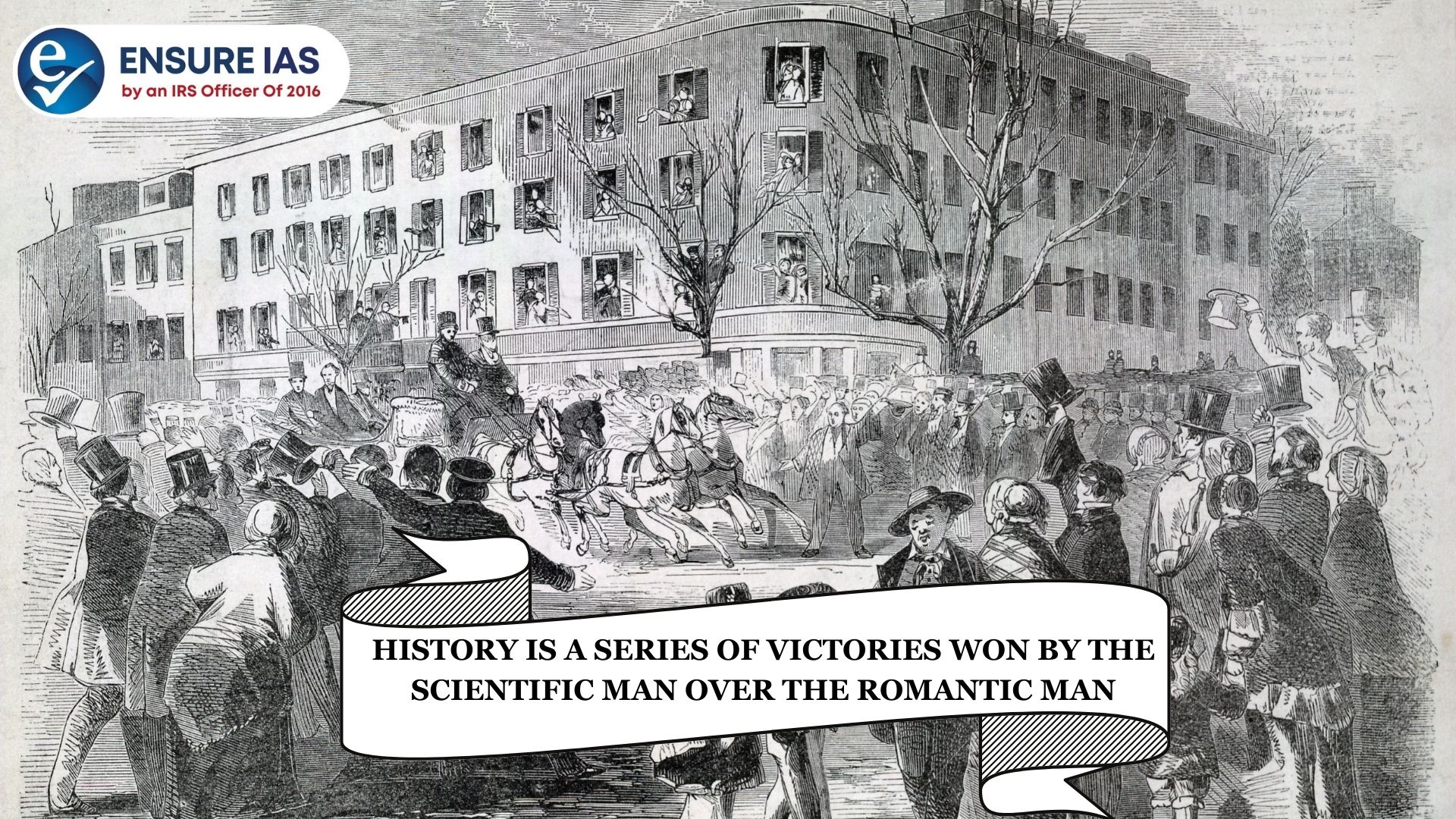- Courses
- GS Full Course 1 Year
- GS Full Course 2 Year
- GS Full Course 3 Year
- GS Full Course Till Selection
- Answer Alpha: Mains 2025 Mentorship
- MEP (Mains Enrichment Programme) Data, Facts
- Essay Target – 150+ Marks
- Online Program
- GS Recorded Course
- Polity
- Geography
- Economy
- Ancient, Medieval and Art & Culture AMAC
- Modern India, Post Independence & World History
- Environment
- Governance
- Science & Technology
- International Relations and Internal Security
- Disaster Management
- Ethics
- NCERT Current Affairs
- Indian Society and Social Issue
- NCERT- Science and Technology
- NCERT - Geography
- NCERT - Ancient History
- NCERT- World History
- NCERT Modern History
- CSAT
- 5 LAYERED ARJUNA Mentorship
- Public Administration Optional
- ABOUT US
- OUR TOPPERS
- TEST SERIES
- FREE STUDY MATERIAL
- VIDEOS
- CONTACT US
HISTORY IS A SERIES OF VICTORIES WON BY THE SCIENTIFIC MAN OVER THE ROMANTIC MAN
HISTORY IS A SERIES OF VICTORIES WON BY THE SCIENTIFIC MAN OVER THE ROMANTIC MAN

At the turn of the 16th century Vasco Da Gama made his famous voyage finding a new route to India through the Cape of Good Hope. Da Gama’s arrival in India brought into being a clash of civilizations. On one hand was the European civilisation, which had been steadily climbing the rungs of scientific progress. On the other hand, was our Indic civilisation, which was stagnating by spending its time not planning for the future but simply romanticising its past. As has been the case throughout the chapters of history, the scientific European won over the romantic Indian leading to centuries of colonial rule.
Who is the scientific man and who is the romantic man? Why does the scientific man win over the romantic man? Are there historical exceptions to this rule? What does the future hold for us? These are some of the questions we shall aim to answer during the course of this essay.
Scientific Men and Romantic Men
Scientific men are those who are guided by the philosophy or principles of science. This philosophy was elucidated by Raja Rammohun Roy in the form of three principles - rationalism, humanism and universalism. Thus, the scientific man is one who is guided by rational and logical thoughts instead of emotions or feelings. He is also one who believes that human wellbeing on Earth is the highest good and readily ignores superstitions or customs if they go against human wellbeing. Finally, scientific men believe in some universal principles that apply to each member of the human race, irrespective of gender, nationality or religion.
From this analysis, we see that scientific men are not just men doing actual science but all men guided by the philosophy of science. Thus, Akshay Kumar Dutt fighting against child marriage by giving medical opinion against it was a scientific man in the social sphere. Similarly, Adam Smith’s Wealth of the Nations talking about a free market economy over the traditional feudal structure made him a scientific man in the economic sphere. Even in contemporary times, the Iranian women protesting against archaic religious laws are guided by principles of humanism and universalism. This makes these women a part of the tag ‘scientific men’ in the political sphere.
Romantic Men exist in complete opposition to such scientific men. They are guided by emotions and feelings, spirituality and an attachment to their religion or culture. Similar to scientific men, romantic men also exist across various fields. Karpatri Maharaj’s opposition to the Hindu Code Bill in post Independent India is an example of romantic opposition to equality in the name of culture. Similarly Mughal emperor Muhammed Shah romanticising past Mughal glory while losing large chunks of his empire in the 18th century is another case in point. Having observed what defines a scientific man and a romantic man, let us now turn our gaze to the triumph of science over romanticism.
Triumph of the Scientific Man
Right from the ascendance of the Mauryan empire (2500 years ago) to the victory of the Allied forces in World War II (75 years ago), history has been witness to the victories of the scientific man. The principal reason for this is the continual development and application of knowledge by the scientific man. The scientific man realises that there are ‘better practices to best practices. This allows the scientific man to improve existing modes of doing a task, thereby giving them an advantage. An example being the discovery of Iron in the Mauryan Empire. Its discovery and usage for developing better weapons became a crucial factor contributing to the victory of the Mauryan across the Indian subcontinent.
Scientific men not only improve existing things but also develop new tools. Historians like Dan Carlin state that ‘technology is the silent factor in military history. Thus it was not Churchill’s motivating speeches or Roosevelt’s strategic mind that won them World War II. Rather it were the radars, aircraft carriers and the Atomic bombs that were the silent factor in their victory. This spirit of reform and innovation is in many ways the secret sauce behind successes of the Scientific men.
Such spirit however is conspicuously absent in the case of the Romantic men. They prefer to lay comfortably in the midst of their memories of past achievements or dreams of a utopian future. The famous traveller Ibn Batuta noted in his book Rehla that Indians were losing their innovative edge in the 14th century AD and were lost reminiscing their glorious past. It is no coincidence that the period of colonialism began some centuries later. Similarly Hitler’s romantic notions of Aryan superiority led him to attack the USSR. While the offense had no military logic, Hitler’s racist views that Slavic people were less than human led to the attack. This event marked the beginning of the end of the Hitler and his ambitions. The ignorant romantic again lost to the logical scientific man.
The Future of History
It is often said that ‘history does not repeat itself but it often rhymes. Thus, even in contemporary times we see the scientific man emerging victorious in various streams. Take for instance the war in Ukraine. NATO’s superior arms are countering Vladmir Putin’s romantic ambitions of reviving the Russian historic sphere of influence. Closer home we see developments like abolition of Triple talaq and entry of women into Sabarimala temple. These once again show us a rational and reformative approach triumphing over a status quoist approach. However, reality is never black or white but always different shades of grey. Thus, the romantic men are also not silently accepting defeat but making comebacks in certain spheres.
The ongoing war in Israel is at its roots tied to the romantic attachment of different people to the same piece of land. This attachment and things done in its pursuit have led to all rationality and humanism going out of the window. Emotions have clearly won over reason. Similarly, the rise of xenophobia across the Western countries against immigrants is another such example. Romanticising ideas like ‘Make America Great Again’ by other-isation of minorities is being accepted by a large number of Americans. This is clear evidence that in some cases, romantic men may well defeat scientific men.
The future of history should no longer be characterised by this battle. Rather it should be guided by complementarity and cooperation between the Scientific man and the Romantic Man. The romantic man can imagine a better future and rouse the passions of all humans to work for such a future. The scientific man can complement this by developing the tools and tactics to make such a future a reality. This is already happening in the field of climate change where the romantics are igniting the dream of a green future and the scientists are working towards technology to make it a reality. This approach of cooperation must be replicated across fields for the benefit of the entire mankind.
Thus, history may have been a series of victories of the scientific man over the romantic man. However, the future of history need not be the same. The future of history should be one of cooperation rather than conflict. One where the romantic man dreams and the scientific man delivers. This can be achieved remembering that there is no inherent conflict between the scientific and the romantic man. We are as India’s G20 motto said ‘One family inhabiting One Earth and having One Future’. Pursuing this common future, we must remember the wise words of Rabindranath Tagore - ‘history of men and nations are merely chapters in the common history of mankind’.
Must Check: Best IAS Coaching In Delhi
Mathematics is the Music of Reason" (MAINS 2024)
The Price of Procrastination: Fulfilling Today’s Duties for a Better Tomorrow

